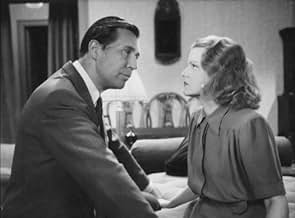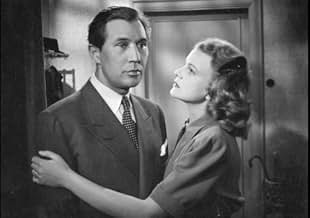Añade un argumento en tu idiomaSet entirely in one room, an innocent young man is accused of plagiarizing the work of an old professor. Later, he will be blamed for the professor's murder.Set entirely in one room, an innocent young man is accused of plagiarizing the work of an old professor. Later, he will be blamed for the professor's murder.Set entirely in one room, an innocent young man is accused of plagiarizing the work of an old professor. Later, he will be blamed for the professor's murder.
Gabriel Alw
- Prof. Sander
- (sin acreditar)
Argumento
¿Sabías que...?
- CuriosidadesAfter its premiere was a complete failure, this feature film was disowned by its director, Carl Theodor Dreyer, who later refused to acknowledge its existence. It rarely appears in Dreyer filmographies or retrospectives, and is not typically discussed by critics (few of whom have seen it).
- ConexionesVersion of Grande Teatro Tupi: O Atentado (1951)
Reseña destacada
Made immediately after Dreyer's magnificent Day of Wrath, Två människor is the one movie that Dreyer completely disowned. This happens from time to time. Kubrick famously disowned Spartacus and Lynch disowned Dune. There were questions of authorship around both, and the same goes for Dreyer's work here. Hired by Svensk Filmindustri to adapt the play "Attentat" by W. O. Somin, Dreyer was stymied from the start. He wasn't allowed to hire the actors he wanted. He was forced to film a flashback scene he didn't want in the film. The producer added a score he hated and didn't feel was appropriate. That doesn't really have much to do with how an audience should view the end product, which ends up a middling exercise in proto-Swedish dramas that Ingmar Bergman would ultimately excel at.
It's about a married couple, Marianna (Wanda Rothgardt) and Arne (Georg Rydeberg) and the tense day they experience after Arne's professional life begins to crumble with accusations that his seminal paper on schizophrenia was plagiarized from a colleague, the never seen Sander. The day is a rollercoaster of emotion as Arne thinks his professional life is over, only to hear on the radio that Sander committed suicide that day. Refreshed with this news that Arne is ashamed to admit he enjoys hearing, Marianne is supportive and dreams of the secure future they will now have.
More news comes over the radio that most likely Sander didn't commit suicide, but that he was murdered. The gun used to kill him is the same model as the gun that Arne had registered with the police as his own, but he didn't commit the murder even though he had been outside Sander's house at roughly that time, pacing back and forth wondering if he should confront the man trying to destroy him. He doesn't have any blood on his clothes, though, so he knows that he's in the clear. Marriane has a secret, though. She killed Sander, and the reasons aren't exactly terribly surprising.
The thing about this movie is that it feels really routine. This is a film about two people discovering crimes of passion and hidden pasts, and nothing feels generally shocking. It doesn't feel right that a relationship drama is so rote. There's a revelation halfway through where Marianne reveals that she had a relationship with Sander before she met Arne. That's standard stuff (not even an affair during, mind you, just that they were a couple beforehand), but then the film makes too much of it. Never mind the melodramatic score, this scene was written all wrong. The police are encircling closer on this murder that they know they have some likelihood of being tied to, and Arne suddenly makes it a huge priority to dig up his wife's previous love life and even goes so far as to announce that he's divorcing her. It's all off.
The movie recovers its feet just enough to keep going once this temper tantrum is over and Marianne is allowed to detail the events that led to Sander's plagiarism of Arne (not the other way around), his attempt at blackmail of Marianne to get her to divorce Arne and marry Sander, and her eventual visit to Sander's house where she killed him with Arne's gun.
It's fine. It's not exactly good, but it functions. I can easily see why Dreyer would look at the final product with all the compromises he had to face and just say that it wasn't his. The final product away from the authorship question is like an early, almost amateur version of Scenes from a Marriage with a murder plot thrown in.
I will note, though, that Dreyer shoots the single set extraordinarily well. Never feeling limited visually, he keeps moving his actors around throughout the film with individual pockets of the film occupying different physical pockets of the two-bedroom apartment. There's not a whole lot to recommend of the film, though. It's surprisingly thin and light for what should be a strongly penetrative dual character piece. The central section is dominated by a conflict that feels wrong and out of place. However, the actors are fine, it's never visually boring or repetitive, and it moves quickly for what it is.
It's about a married couple, Marianna (Wanda Rothgardt) and Arne (Georg Rydeberg) and the tense day they experience after Arne's professional life begins to crumble with accusations that his seminal paper on schizophrenia was plagiarized from a colleague, the never seen Sander. The day is a rollercoaster of emotion as Arne thinks his professional life is over, only to hear on the radio that Sander committed suicide that day. Refreshed with this news that Arne is ashamed to admit he enjoys hearing, Marianne is supportive and dreams of the secure future they will now have.
More news comes over the radio that most likely Sander didn't commit suicide, but that he was murdered. The gun used to kill him is the same model as the gun that Arne had registered with the police as his own, but he didn't commit the murder even though he had been outside Sander's house at roughly that time, pacing back and forth wondering if he should confront the man trying to destroy him. He doesn't have any blood on his clothes, though, so he knows that he's in the clear. Marriane has a secret, though. She killed Sander, and the reasons aren't exactly terribly surprising.
The thing about this movie is that it feels really routine. This is a film about two people discovering crimes of passion and hidden pasts, and nothing feels generally shocking. It doesn't feel right that a relationship drama is so rote. There's a revelation halfway through where Marianne reveals that she had a relationship with Sander before she met Arne. That's standard stuff (not even an affair during, mind you, just that they were a couple beforehand), but then the film makes too much of it. Never mind the melodramatic score, this scene was written all wrong. The police are encircling closer on this murder that they know they have some likelihood of being tied to, and Arne suddenly makes it a huge priority to dig up his wife's previous love life and even goes so far as to announce that he's divorcing her. It's all off.
The movie recovers its feet just enough to keep going once this temper tantrum is over and Marianne is allowed to detail the events that led to Sander's plagiarism of Arne (not the other way around), his attempt at blackmail of Marianne to get her to divorce Arne and marry Sander, and her eventual visit to Sander's house where she killed him with Arne's gun.
It's fine. It's not exactly good, but it functions. I can easily see why Dreyer would look at the final product with all the compromises he had to face and just say that it wasn't his. The final product away from the authorship question is like an early, almost amateur version of Scenes from a Marriage with a murder plot thrown in.
I will note, though, that Dreyer shoots the single set extraordinarily well. Never feeling limited visually, he keeps moving his actors around throughout the film with individual pockets of the film occupying different physical pockets of the two-bedroom apartment. There's not a whole lot to recommend of the film, though. It's surprisingly thin and light for what should be a strongly penetrative dual character piece. The central section is dominated by a conflict that feels wrong and out of place. However, the actors are fine, it's never visually boring or repetitive, and it moves quickly for what it is.
- davidmvining
- 9 ago 2021
- Enlace permanente
Selecciones populares
Inicia sesión para calificar y añadir a tu lista para recibir recomendaciones personalizadas
Detalles
- Duración1 hora 18 minutos
- Color
- Mezcla de sonido
- Relación de aspecto
- 1.37 : 1
Contribuir a esta página
Sugerir un cambio o añadir el contenido que falta

Principal laguna de datos
By what name was Dos personas (1945) officially released in Canada in English?
Responde






















